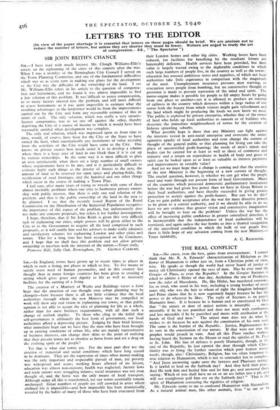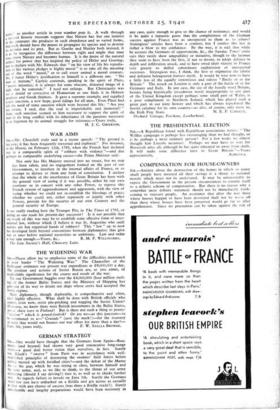THE REAL CONFLICT
Si,—No cause, even the best, gains from overstatement. I cannot think that Mr. R. A. Edwards' characterisation of Hitlerism as the flower of Humanism is either just or, from a Christian point of view, wise. He speaks as though the world had never heard of justice or mercy till Christianity opened the eyes of men. Has he ever read the Gorgiai of Plato, or even the Republic? In the Gorgias Socrates is asked to admire a Hitler of that day, Archelaus the son of Perdiccas, now the ruler of Macedonia. He, like Hitler, has murdered everyone, foe or rival, who stood in his way, including a young brother of seven years old, who was the heir to whom of right the kingdom belonged; and Polus claims that he is now supremely happy because he has the power to do whatever he hies. The reply of Socrates is on purely Humanist lines. It is because he is human and so constituted by God that "the unjust or doer of unjust actions is miserable . . . more miserable if he be not punished and does not meet with retribution, and less miserable if he be punished and meets with retribution at the hands of God and men." The unjust man does not do what he wishes to do because he acts against the constitution of his own soul. The same is the burden of the Republic. Justice, Righteousness has its root in the constitution of our nature. If that were not true the prophet would preach in vain. And all this Plato teaches withou: having heard the Sermon on the Mount or read the epistles of St. Paul or St. John. His line of defence is purely Humanist, though, at the end of the Republic, he just opened the door through which Chris- tianity was to bring the further sanction which poor human nature needs, though, alas! Christianity, Religion, has too often forgotten its true relation to Humanism, which is not to contradict but to complete. "And Jesus answering spake unto the lawyers and Pharisees saying.
And He took him and healed him and let him go; and answered them held their peace. Is it lawful to heal on the Sabbath day? And they th saying: Which of you shall have an ox or an ass fallen into a pit, and will not straightway pull him out on the Sabbath day?" That is the spirit of Humanism correcting the rigidities of religion. Mr. Edwards seems to me to confound Humanism with Naturalism. As a natural animal man, like other animals, lives " to eat or be
atm," as another article in your number _puts it.. A walk through a natural history museum suggests that Nature has but one interest in the creatures she produces in such abundance and so varied forms, that each should have the means to propapte its species and to destroy its enemies and its prey. But as -Goethe and Huxley both insisted, it is as he recognises the difference between right and might that man rises above Nature and becomes human. It is the desire of the natural animal for power that has inspired the policy of Hitler and Goering; but to declare with Mr. Edwards that "on his view of life his repudia- tion of his various pledgesis highly moral" is to take all the meaning - out of the word "moral," or to call every animal a moral creature. No, I fancy Hitler's justification to himself is a different one. " No - man at bottom," Carlyle contends, speaking in the spirit of Plato, "means injustice; it is always for some obscure, distorted image of a right that he contends." I need not enlarge. But Christianity was not a denial or corrective of Humanism as one finds it in Hebrew prophets and Greek thinkers. It gave a supreme example, and supplied a new sanction, a new hope, good tidings for all men. Even Plato had. kit the need of some sanction which went beyond this life: "Are you not aware, I said, that the soul is imperishable and immortal? " Some such sanction seemed to him necessary to support the spirit of man in its long conflict with its inheritance of the passions necessary to or begotten by its animal struggle for existence.—Yours truly,
H. J. C. GRIERSON.



























 Previous page
Previous page